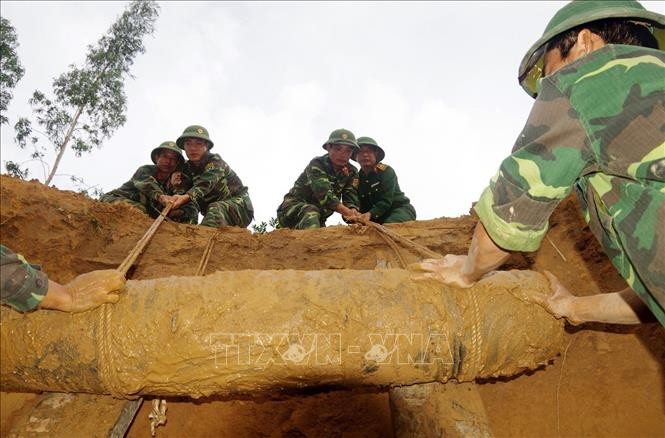(VOVWORLD) - Vietnam convened on Thursday an online Ministerial Meeting themed “Addressing mine and bomb consequences and maintaining sustainable peace – Strengthening connectivity for more effective action”. The meeting is in response to the International Day for Mine Awareness and Assistance for Mine Action organized by the UN on April 4 annually.
 (Photo: VNA) (Photo: VNA) |
Vietnam is one of several countries that still suffer serious consequences of hundreds of thousands of tons of bombs and mines scattered during war time. In the anti-US war from 1964 to 1975, more than 16 million tons of bomb and shells bombarded Vietnam, 4 times the amount of bombs and mines used in World War I. Though peace was restored in Vietnam decades ago, the risk of bomb and mine injuries persists in many places in Vietnam, threatening the lives of ordinary people and hampering Vietnam’s socio-economic development.
Vietnam will need hundreds of years to become completely rid of bomb and mine pollution. Vietnam has mobilized its resources to accelerate mine actions, a matter of serious concern to the Vietnamese government and millions of Vietnamese people.
Vietnam signed the Convention on Prohibitions or Restrictions on the Use of Certain Conventional Weapons Which May be Deemed to be Excessively Injurious or to Have Indiscriminate Effects (CCW) and participated in several conferences and seminars on bomb and mine action including the Anti-Personnel Mine Ban Convention (APMBC) and the Convention on Cluster Munitions (CCM) and the Convention on Certain Conventional Weapons (CCW) to honor its responsibility, publicize Vietnam’s mine and bomb pollution, and its efforts and achievements in mine action, and mobilize other countries, international organizations, and non-governmental organizations to assist Vietnam’s mine action.
The Vietnamese government has created a National Action Program to tackle the problem of post-war bombs and mines until 2025 and issued a decree in 2019 on the settlement of post-war UXO consequences in Vietnam. The Vietnam Mine Action Center released a report on post-war bombs, mines, and UXO in Vietnam, and a map of bomb, mine, and UXO pollution. Two international workshops on war recovery in Vietnam were organized in New York and Washington in March 2019 by the State Steering Committee on the National Action Program for Overcoming the Impact of Post-War Bombs and Mines. An exhibition called “Vietnamese women join hands for sustainable safety in Vietnam” was organized by the Foreign Ministry on the sideline of the International Conference on Women, Peace, and Security in Hanoi in 2020.
Addressing bomb and mine consequences is not just a problem facing Vietnam. More than 60 countries around the world are facing serious challenges posed by bombs, mines, and UXOs left over from the wars. 15,000 people around the world are injured or killed by UXOs each year.
As a non-permanent member of the UN Security Council and temporary Chairman of the UN Security Council this month, Vietnam is making overcoming bomb and mine consequences a priority.
The UN’s Sustainable Development Agenda until 2030 considers mine action a major goal.
As a non-permanent member of the UN Security Council, Vietnam has reiterated the importance of mine action in post-conflict reconstruction and proposed including mine action to new documents like Resolution 2540 on extending the UN Mission in Somalia. Vietnam has doubled its efforts to boost mine action to ensure safety from UXOs, and help victims recover their life.
The meeting on Thursday, April8, will be an open discussion on bombs and mines, their challenges, and experience in addressing bomb and mine issues, as well as measures to better address the problems.
The UN has several times praised Vietnam as a model for developing countries and countries recovering from poverty and war damage. Vietnam is a living testimony to the effectiveness of efforts to overcome bomb and mine consequences and maintain peace.